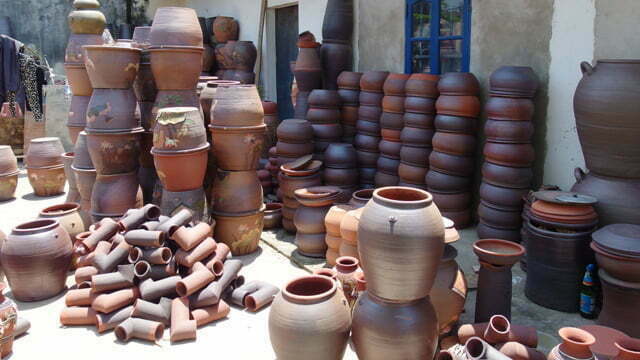Located 60 km from Hanoi, Phu Lang ceramic village in Que Vo district, Bac Ninh province, is one of the oldest pottery centers of the Red River Delta.
The village is best known for its unique pottery products that are made with traditional techniques.
Located on the Cau River, the ceramic village of Phu Lang retains the simple beauty and peaceful atmosphere of yesteryear with its narrow zigzag lanes, red brick walls, and unchanging scenes of rural Vietnam. Jars and vases line the roads of the village because almost every family in the village makes pottery.
According to the book titled “Kinh Bac-Ha Bac”, the founder of the pottery craft in Phu Lang was Mr. Luu Phong Tu. In the Ly dynasty, Mr, Tu was sent as an envoy to China, where he learned the pottery craft. Back in Vietnam, he passed on his knowledge to the people of the Red River Delta. It was at the beginning of the Tran dynasty in the 13th century that pottery first appeared in Phu Lang. 70-year-old Tran Thi Giang says when she was a child, everyone in the village made pottery and the products were sold throughout the country. Her family has made pottery for more than a hundred years: “I started doing this job when I was 13 years old. At that age, I could work with clay and modeling. Previously, my family made jars. It was very hard because we had to do everything by hand. Today, it is much easier with the help of an electric spinning wheel.”
While Tho Ha ceramic is made of green clay, and Bat Trang ceramic is of white clay, Phu Lang ceramic is made of red clay. Pham Van Thanh, a potter in Phu Lang says Phu Lang pottery products are quite varied, ranging from intricately carved devotional items like Buddha statues and urns, to simple household utensils like jars and vases. Decorative patterns on the ceramic products are also varied featuring the landscapes and daily activities of rural Vietnam. Thanh said: “All the work is still done manually. We don’t use modeling machines. To glaze the products, we use our home-made glaze and measure the heat of firewood”.
The firing process plays an important role in making pottery in Phu Lang. Here, local people still use firewood to fire the ceramics and it is changes in the temperature of the furnace that gives Phu Lang pottery its special colors: brown, yellowish or dark brown. Thanh says Phu Lang ceramics are special and renowned for the diversity and quality of its enamels. Indeed, the shapes of Phu Lang pottery are raw and rough. Thanh again: “The furnaces in Phu Lang are different from those in other villages. For example, Dong Trieu ceramics in Quang Ninh province require higher temperatures, Bat Trang ceramics are earthenware ceramics fired with gas. The furnace in Phu Lang is monitored with the experience of the craftsmen themselves and not everyone can do that. When I look in the furnace, I can see how the enamel changes with the increase of the temperature and when the temperature reaches 1,200 degrees, it turns transparent. After 24 hours, the temperature increases and we fire the products for another 24 hours”.
Today, Phu Lang is a popular tourist attraction that appeals to both Vietnamese and foreign tourists. They come to discover the village and its pottery. Come to Phu Lang and make your own a product to give to someone you love as a souvenir. Phu Lang potters are always there to welcome you.



